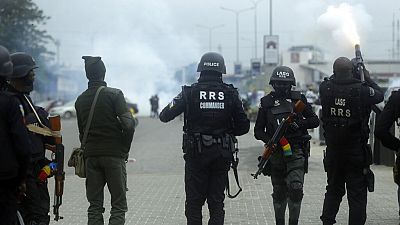Source: BBC
Gunmen attacked a U.S. convoy in southeastern Nigeria on Tuesday, killing four non-Americans and kidnapping three others, official sources said.
“No U.S. citizens were in the convoy,” said Nigerian police spokesman Ikenga Tochukwu, who was confirmed by White House National Security Council spokesman John Kirby.
The gunmen “killed two police mobile force officers and two U.S. consulate employees” before setting their vehicle on fire, Tochukwu said.
The attack took place at 3:30 p.m. (1430 GMT) on Tuesday in Ogbaru district of Anambra state, police said.
Security forces were deployed to the scene but the gunmen managed to kidnap two police officers and a driver, Tochukwu detailed.
– “Rescue operation” –
A “rescue and recovery operation” was underway Tuesday evening, he added in a statement.
John Kirby confirmed the attack at a press briefing in Washington. “A U.S. convoy of several vehicles was attacked. What I can tell you is that no U.S. citizens are involved,” the spokesman said.
The U.S. State Department, for its part, assured that the U.S. diplomatic staff in Nigeria was “at work” with the Nigerian security services to conduct investigations.
“The safety of our personnel is always paramount and we take extreme precautions when arranging travel in the field,” a State Department spokesman said.
Several separatist groups are active in the southeastern region and have recently stepped up their attacks, usually targeting police and government buildings.
Nigerian authorities attribute the attacks to the Indigenous People’s Movement of Biafra (IPOB), which they consider a terrorist group, along with its armed wing the Eastern Security Network.
Ipob has repeatedly denied any involvement in the violence.
Separatism is a sensitive issue in Nigeria, where an attempt by army officers to secede from Biafra in 1967 sparked three years of civil war that left more than a million people dead.
Ipob leader Nnamdi Kanu is currently in detention and is due to appear in court on charges of treason after being detained abroad and then brought back to Nigeria.
The violence is one of many security challenges facing President-elect Bola Tinubu when he takes over as head of Africa’s most populous country later in May.
In addition to separatist tensions in the southeast, Nigeria’s military must fight jihadists in the northeast.




